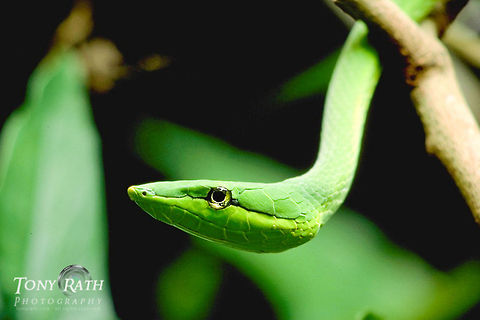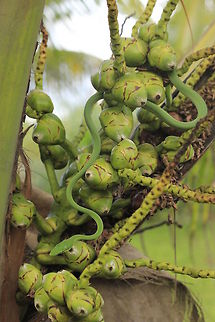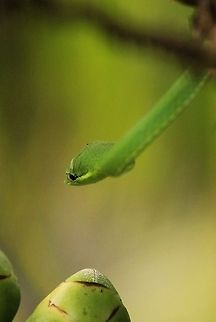
Appearance
This snake is very slender, roughly 2 cm thick, and may attain a total length of about 1.5–2 m. The tail is long and very delicate, but mostly used to hold on while reaching for prey. The head is aerodynamically shaped and very pointy, the mouth is very large and extends almost the whole length of the head. The tongue is long and green; when in use it is kept outside the mouth and moved up and down. this behavior is reflected in other species of vine snake and it is believed that they are using their tongues as sights the way a cat uses its whiskers, as they move very quickly through branches and brush.It is bright green dorsally, and yellowish green ventrally and on the upper lip. There is a narrow yellowish-white stripe along each side of the belly and tail.
Snout very prominent, about three times as long as the diameter of the eye. No loreal, prefrontal contacting 2 or 3 upper labials. 9-10 upper labials, 4th, 5th, and 6th entering the eye. Temporals very large, 1 + 2.
Dorsal scales weakly keeled, arranged in 17 rows at midbody. Ventrals 198-217; anal plate divided; subcaudals 139-165, also divided.

Naming
Common names used in South America for this species include "bejuca lora, bejuquilla verde, cipo, " and "cobra bicuda".
Behavior
Vine snakes must be kept in large terrariums with a height of at least 2 m and a surface of 6–16 square meters. The behavior towards humans is neutral and the snake usually goes to the other end of the terrarium. Some adapt very well and even come closer. Unlike their Asian look-alikes, these snakes will readily take mice and some are even large enough to eat rats. This fact makes them a prized choice among reptile collectors. Captive life spans are estimated at 9–15 years.References:
Some text fragments are auto parsed from Wikipedia.